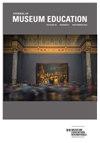在大学环境中对博物馆物品的关怀与关怀
IF 0.6
Q3 EDUCATION & EDUCATIONAL RESEARCH
引用次数: 0
摘要
在新自由主义大学的普遍逻辑中,教学和学习受到学术审计、绩效指标和质量保证措施的约束。这些影响了教育者和学生之间的关系,强调自我而不是集体利益,有抱负的流动性,以及一种“速度”和生产力的文化,几乎没有时间进行反思。这种影响在前理工学院(92后)大学中可能更为明显,这些大学的重点在于就业能力、创意产业和职业培训。在这种情况下,在学习环境中引入关怀需要做些什么?本文考虑了体现教学法的积极潜力,以产生与新自由主义教育话语相对抗的认识方式。在米德尔塞克斯大学(Middlesex University)的国内设计与建筑博物馆(Museum of Domestic Design and Architecture),通过与学生面对面交流的基于对象的教学实践,本文考虑了这种接触如何产生激进的护理实践。在知识经济时代,博物馆如何提出挑战机构期望的论据?这些空间在多大程度上为新自由主义逻辑之外的另一种“公地”提供了可能性?本文章由计算机程序翻译,如有差异,请以英文原文为准。
Towards Sensibilities of Caring with and for Museum Objects in a University Context
ABSTRACT Within the prevalent logic of the neoliberal university, teaching and learning are subject to academic audits, performance indicators and quality assurance measures. These impact on the relationships between educators and students, placing an emphasis on self- over collective interests, aspirational mobility, and a culture of ‘speed’ and productivity that leaves little time for reflection. The effects of this are perhaps even more acutely felt in former polytechnic (post-92) universities, where the focus lies on employability, the creative industries, and vocational training. In this context, what does it entail to bring care into the learning environments? This paper considers the activist potential of embodied pedagogies to generate ways of knowing that confront discourses of neoliberal education. Drawing on object-based pedagogic practice with students in face-to-face sessions at the Museum of Domestic Design and Architecture (Middlesex University), the paper considers how such encounters might generate radical practices of care. How might the museum formulate arguments which challenge institutional expectations to perform in the knowledge-based economy? To what extent might these spaces open possibilities for an alternative “commons” beyond neoliberal logics?
求助全文
通过发布文献求助,成功后即可免费获取论文全文。
去求助
来源期刊

Journal of Museum Education
EDUCATION & EDUCATIONAL RESEARCH-
CiteScore
1.20
自引率
16.70%
发文量
34
期刊介绍:
The Journal of Museum Education (JME) is the premier peer-reviewed publication exploring and reporting on theory, training, and practice in the museum education field. Journal articles—written by museum, education, and research professionals—explore such relevant topics as learning theory, visitor evaluation, teaching strategies for art, science, and history museums, and the responsibilities of museums as public institutions. Published 4 times a year, each issue consists of a guest edited section focused on a specific theme and articles about new research, current trends, tools, frameworks, and case studies, perspectives, and book, exhibit, and program reviews.
 求助内容:
求助内容: 应助结果提醒方式:
应助结果提醒方式:


